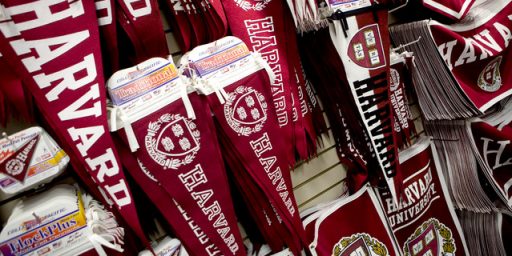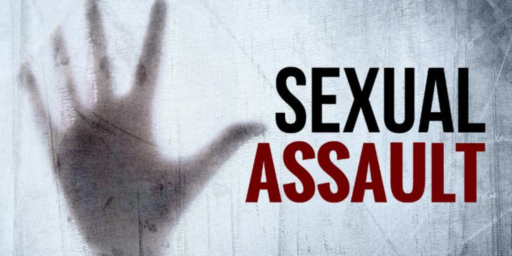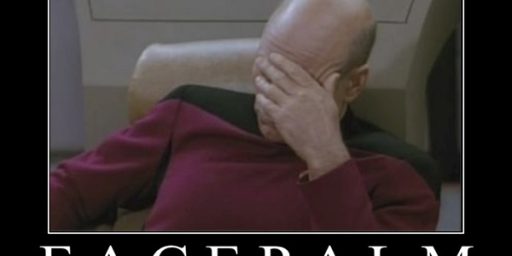Professor Gets 200 Confessions to Cheating
Richard Quinn, a business professor at the University of Central Florida, got suspicious after a historically high grade distribution on the midterm for his capstone course and decided to scare his students.
Richard Quinn, a business professor at the University of Central Florida, got suspicious after a historically high grade distribution on the midterm for his capstone course and decided to scare his students:
In the lecture, Prof Quinn told the class he had enough evidence from statistical analysis and other investigatory techniques to identify most cheats, but instead of handing the list over to the university authorities for discipling, he proposed a deal.
He said: “I don’t want to have to explain to your parents why you didn’t graduate, so I went to the Dean and I made a deal. The deal is you can either wait it out and hope that we don’t identify you, or you can identify yourself to your lab instructor and you can complete the rest of the course and the grade you get in the course is the grade you earned in the course.”
As a former professor, I’m of mixed minds. On the one hand, it’s great that he caught the cheaters and went through the trouble to try to teach them a life lesson. On the other, he’s largely to blame for creating the environment that encouraged cheating to begin with.*
While I finally relented to the incentives and started using multiple choice exams on large freshman survey courses, I would never have used them for upper level courses, much less a “capstone.” And, even when I used multiple choice exams, I never relied heavily on publisher-provided test banks. That’s not only exceedingly lazy but asking for trouble.
Crafting the exam isn’t something that ought be farmed out to one’s graduate students — much less the textbook publisher. Testing is part of teaching. It’s a way of forcing students to grapple with the material, extract major points, and understand how the pieces relate to one another.
Well crafted exams are such that having the questions ahead of time wouldn’t constitute cheating. Indeed, following the example of my dissertation advisor, Don Snow, I typically handed out the questions ahead of time as a “study guide.” There might be 8 or 10 questions on the guide and I’d choose 3 or 4 — often through some random device such as the roll of a die — that they’d have to answer.
I made it clear to students that there was no way to cheat on the exam ahead of time. They were free to use whatever tools, techniques, resources, and methods they wished. They could work collaboratively. They could looks things up on the Internet. Whatever. But they had to write cogent essays about the material on exam day.
Incidentally, I’m rather suspect of Quinn’s claims to having sophisticated “forensic” techniques for ferreting out the cheaters. It’s possible that there was an error or two in the exam key, which would make it easy to form high degrees of suspicion around students who got near-perfect scores but answered right/wrong on those questions. But there would be no certainty.
Voiding the grades of the two-thirds of the class who admittedly didn’t cheat is dubious as well.
UPDATE: Not only some students but even other business professors are asking whether studying from a textbook publisher’s test bank is even “cheating” in any meaningful sense:
Donald McCabe, a business professor at Rutgers University in New Jersey who studies college cheating, said the UCF case is ambiguous since students might not have known the exact questions would be on their exam. “If they thought they were using it as a study guide, it’s hard to argue they were blatantly cheating,” McCabe said.
It’s a fair question. It’s not as if they broke into his office or otherwise intercepted the exam in question (say, it accidentally got left on a photocopying machine). If students thought the professor was writing his own questions and merely using the test bank for practice tests, then their actions were totally above board.
*UPDATE 2: Upon further reflection, I put most of the blame on the CFU administration. Quinn had no reasonable alternative to multiple choice exams, even for a “capstone course,” with 600 students packed into the room. There’s not even the pretense of a university education being offered in that environment. The kids would get more individualized attention at the University of Phoenix or another degree mill. Which, frankly, is what CFU has allowed themselves to become.
via Jason Kottke







m/c exams in an upper level captsone?
Ugh.
I had a professor at Georgetown U.–Carroll Quigley–who notoriously gave the same final exam year after year. He just changed the answers to match what he’d emphasized in that year’s (mandatory) course. He also notoriously had a flunk rate of around 50% for either of both semesters of the course. Summer school was a fact of life for students in the School of Foreign Service.
FWIW, it’s not quite as cut-and-dry that (at least many of) the kids were cheating as the article makes it appear. The professor had said in class that he’d write the exam himself, then apparently changed his mind later and used the textbook company’s question bank.
Meanwhile a lot of the same questions were circulating amongst the students as a “study guide”. I’m not sure where the list was procured from but I don’t think there’s any evidence of foul play per se. A lot of times previous exams and such are floating around and are completely fair game.
The ethical question would be if/when the students realized that the test questions were very similar or identical to the questions they’d been practicing on, do they have an obligation to inform the teacher? If I was in that position I’d probably assume that the teacher knows what he’s doing and go about my business.
Regardless, a lot of the kids who “confessed” did so with this little video rant being the first hint that any of them had had that they’d done anything wrong. Just because the professor characterizes them as cheaters doesn’t make it true.
James,
For whatever it’s worth, I have been doing the exact same thing you describe regarding upper-division classes for a couple of years now. One of the best decisions I’ve made as an academic. I figure as long as I get the work out of them and they learn the material, it doesn’t much matter to me how it happens.
@Rick
That was always my thinking: The point was for the students to learn the damn material, not guess what the instructor thinks important.
//Incidentally, I’m rather suspect of both Quinn’s claims to having sophisticated “forensic” techniques for ferreting out the cheaters. It’s possible that there was an error or two in the exam key, which would make it easy to form high degrees of suspicion around students who got near-perfect scores but answered right/wrong on those questions. But there would be no certainty.//
Regarding this, I figured that there was at least some discrepancy between the answer key and the test itself. Either there were some original tests in there or the key had changed between the two (like annual changes and such).
On the other hand, the terms of confession are *so generous* that I wonder if you’re not right. I was thinking that even if I didn’t cheat on the test that I might confess simply because taking a four hour ethics course might be preferable to even an unlikely test of being a false positive and having your academic career ruined.
<blockquote>Incidentally, I’m rather suspect of both Quinn’s claims to having sophisticated “forensic” techniques for ferreting out the cheaters.</blockquote>
Seems more likely to me the man was just bluffing. To fair success.
Redo the test and get off the high horse professor. If your testing method was flawed don’t blame the kids and don’t bluff with a kids future. These students probably didn’t see what they were doing as cheating but just dumb luck that they stumbled upon study guide/answers or whatever. I doubt you will really meet with any parents or take it to the Dean so why lie to the students? If they really cheated why strike a deal?
I have no idea of who is cheating and who is not, my wife has a 98.6% score on her coursess and has been plagarized on at least a quarter dozen ocassions;…
Sooooooo???? (and if she knew I said that she would have my ass….)